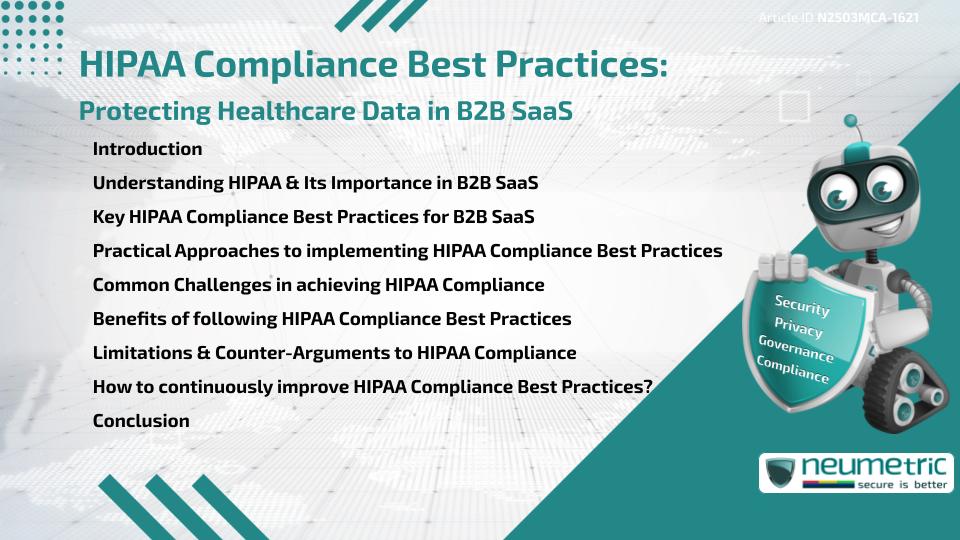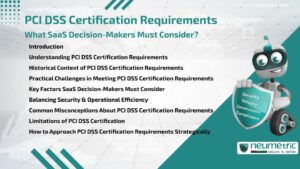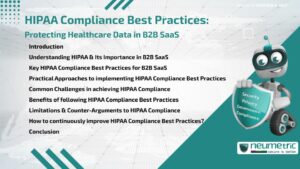Table of Contents
ToggleIntroduction
In today’s digital world, protecting Healthcare Data has been very important. For B2B SaaS Providers working with Health Information, following HIPAA Compliance Best Practices is not optional. It is a Legal Requirement & a vital Trust Factor. This article explains what HIPAA Compliance means, why it matters & how B2B SaaS Companies can adopt Best Practices to secure Sensitive Healthcare Data effectively.
Understanding HIPAA & Its Importance in B2B SaaS
The Health Insurance Portability & Accountability Act [HIPAA] was introduced in 1996 to safeguard Sensitive Patient Health Information. In the B2B SaaS Environment, Companies that manage or process Health Data must ensure that their Systems meet HIPAA Standards.
Key HIPAA Compliance Best Practices for B2B SaaS
Adopting HIPAA Compliance Best Practices starts with understanding the key areas that need attention:
- Access Controls: Limit who can view or modify protected Health Information [PHI].
- Data Encryption: Encrypt Data at rest & in transit to protect it from unauthorised access.
- Regular Risk Assessments: Frequent evaluations should be conducted to identify Vulnerabilities.
- Employee Training: Train staff on HIPAA Regulations & Security Best Practices.
- Audit Controls: Implement Systems that track access to & changes in PHI.
- Business Associate Agreements [BAA]: Ensure Legal Contracts are in place with all partners handling PHI.
- Incident Response Plans: Create & practice Procedures for Data Breach Responses.
Applying these HIPAA Compliance Best Practices consistently can make the difference between Safeguarding Trust & facing Heavy Penalties.
Practical Approaches to implementing HIPAA Compliance Best Practices
A practical way to implement HIPAA Compliance Best Practices is to embed them into daily operations. Companies should create clear Policies, offer regular Training & integrate Security Tools into their SaaS Platforms.
For example, Access Controls can be managed by setting up Role-based Permissions. Data Encryption can be automated using Cloud Service Providers that offer HIPAA-Compliant Services. Small actions like these, when added together, form a strong defense against potential Breaches.
Common Challenges in achieving HIPAA Compliance
Despite the clear Guidelines, many B2B SaaS Providers struggle to meet HIPAA Compliance Best Practices. Common challenges include:
- Lack of dedicated Resources
- Rapid Technology changes
- Misunderstanding Compliance Requirements
- Complex Third Party integrations
Achieving HIPAA Compliance requires attention, flexibility & a clear map—usually in the form of a strong Compliance Program.
Benefits of following HIPAA Compliance Best Practices
There are several clear advantages to adopting HIPAA Compliance Best Practices:
- Customer Trust: Clients feel secure knowing their Data is protected.
- Competitive Advantage: Compliance can be a strong selling point.
- Risk Reduction: Proper practices significantly reduce the chance of Breaches.
- Legal Protection: Compliance helps avoid costly Fines & Lawsuits.
Limitations & Counter-Arguments to HIPAA Compliance
Some argue that HIPAA Compliance Best Practices are costly & slow down innovation. While there is some truth to this, ignoring HIPAA Standards can lead to even more expensive Breaches & loss of Reputation.
In the long run, following HIPAA Compliance Best Practices saves both Money & Brand Value.
How to continuously improve HIPAA Compliance Best Practices?
HIPAA Compliance is not a one-time task. It is a continuous journey. B2B SaaS Companies should:
- Schedule regular Audits
- Update Policies as new Threats emerge
- Refresh Employee Training yearly
- Review BAAs periodically
By treating HIPAA Compliance Best Practices as part of Business Operations, Companies can ensure they are always ready to protect Healthcare Data.
Conclusion
Protecting Healthcare Data is crucial for B2B SaaS Companies working with Sensitive Information. Following HIPAA Compliance Best Practices not only ensures Legal Compliance but also builds Customer Trust & strengthens Brand Reputation. Through a combination of strong processes, committed people & smart technologies, B2B SaaS Providers can effectively secure Health Information.
Takeaways
- HIPAA Compliance Best Practices are essential for protecting PHI in B2B SaaS.
- Key practices include Access Controls, Encryption, Risk Assessments & Training.
- Practical approaches involve embedding Compliance into daily operations.
- Common challenges can be overcome with Planning & Resources.
- Continuous Improvement ensures long-term success in HIPAA Compliance.
FAQ
What are HIPAA Compliance Best Practices for B2B SaaS Companies?
HIPAA Compliance Best Practices for B2B SaaS Companies include implementing Access Controls, Encrypting Data, conducting Risk Assessments & training Employees on HIPAA Rules.
How often should B2B SaaS Companies update their HIPAA Compliance measures?
Companies should update HIPAA Compliance measures at least once a year or whenever there are significant changes in Regulations, Technology or Company Operations.
Why is Encryption important in HIPAA Compliance Best Practices?
Encryption protects Sensitive Health Data from unauthorised access, both while it is stored & while it is being transmitted over Networks, making it a core HIPAA Compliance Best Practice.
What challenges do Companies face in maintaining HIPAA Compliance Best Practices?
Challenges include staying updated with Technology changes, managing Third Party Risks & ensuring ongoing Employee Training & Awareness.
Can Small SaaS Companies afford to follow HIPAA Compliance Best Practices?
Yes, by leveraging affordable HIPAA-compliant Cloud Services & focusing on key areas like Training & Encryption, Small SaaS Companies can follow HIPAA Compliance Best Practices effectively.
How do Business Associate Agreements [BAA] fit into HIPAA Compliance Best Practices?
BAAs are Contracts that ensure all parties handling PHI meet HIPAA requirements, making them an essential part of HIPAA Compliance Best Practices.
Are HIPAA Compliance Best Practices only about Technology?
No, they also involve Processes, Employee Behavior, Contracts with Partners & Regular Reviews to ensure all aspects of Data handling meet HIPAA Standards.
What happens if a SaaS Company does not follow HIPAA Compliance Best Practices?
Failure to follow HIPAA Compliance Best Practices can result in Heavy Fines, Lawsuits, loss of Client Trust & long-term damage to Reputation.
Need help?
Neumetric provides organisations the necessary help to achieve their Cybersecurity, Compliance, Governance, Privacy, Certifications & Pentesting goals.
Organisations & Businesses, specifically those which provide SaaS & AI Solutions, usually need a Cybersecurity Partner for meeting & maintaining the ongoing Security & Privacy needs & requirements of their Clients & Customers.
SOC 2, ISO 27001, ISO 42001, NIST, HIPAA, HECVAT, EU GDPR are some of the Frameworks that are served by Fusion – a centralised, automated, AI-enabled SaaS Solution created & managed by Neumetric.
Reach out to us!





